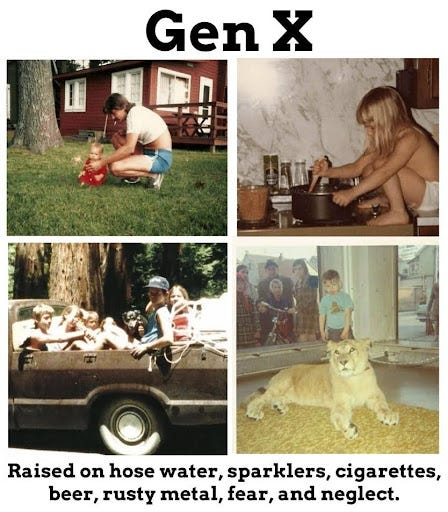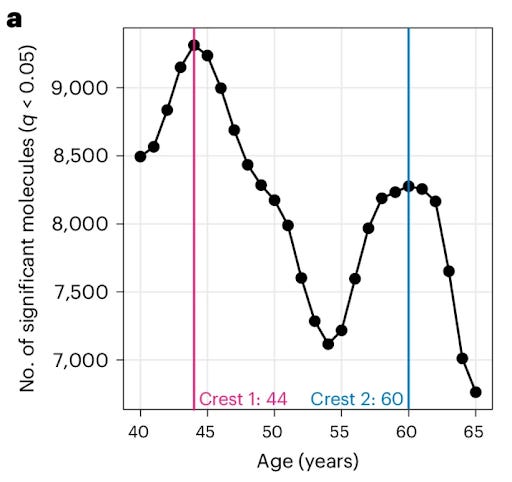Are we really aging in bursts?
We know, it feels true. But if you are reaching one of these aging milestones, don’t panic.
A recent study in the journal Nature Aging made headlines claiming that rather than aging gradually, humans age in accelerated “bursts”- specifically at age 44 and 60. I saw this news all over my social media, mostly from fellow Gen Xers nodding in agreement that our aging bodies had taken sudden and dramatic turns for the worse. This confirmation bias was strengthened with the detail that some of the biggest changes in biological markers at these ages had to do with alcohol and caffeine metabolism 🤔 🍷☕.
But like a lot of science covered in the media, the results of this study may be a *tad* oversold.

Perhaps the hose water is finally catching up with us…
What did the study actually say?
The study gathered data from 108 people aged 25-75, all volunteers from Northern California. The respondents provided blood, stool samples, oral, skin, and nasal swabs every 3-6 months, over a median follow-up period 1.7 years. From these samples, the scientists analyzed A LOT of biological markers. In addition to “traditional” measures you might get from your doctor, such as blood glucose and cholesterol levels, the biological profiling went very deep to include what are called multi-“omics” measures. These ‘omics measure biological activity at the molecular level across many systems including the transcriptome (part of gene expression), the proteome (protein expression), the metabolome (collection of metabolites), the microbiome (gut bacteria), and more. These data are *super cool* and reflect technological advances that allow us to peer into our own biology in more detail. Over time, we will no doubt learn a lot from such detailed data. For now, these measures are quite new, and it is early days for making sense of all this data (like trying to drink from a fire hose 😉).
The paper then uses a variety of statistical models to explore whether these thousands of markers change gradually (akin to a straight line) with age, or whether they change more dramatically at certain ages. The authors concluded that there was a nonlinear pattern in these molecular markers of aging, with two major periods of accelerated aging occurring at around 44 years and 60 years of age. The function of some of the identified molecular changes included markers that are important for kidney function, immune regulation, as well as alcohol and caffeine metabolism.

Figure 4, Waves of Molecules and Microbes During Aging: Number of molecules and microbes differentially expressed during aging.
But despite the seemingly common sense of these findings, there are some important limitations.
The study doesn’t really measure “aging.” Ideally, to identify the aging process, you would follow the same people to see how their biological markers change and whether this is gradual or non-linear across time (and at certain age thresholds). This study could not do that since each person was followed for a relatively short time. Instead, the study compared people of different ages and inferred that the differences in markers reflected processes as if the same individual were aging.
This may seem like a small difference, but it’s potentially important. While many differences across old and young people *are* directly related to biological aging (think gray hair), other differences have to do with social roles and the particular life stage we are in (think changing diet, stress and sleep patterns). Age 44, for example, is a time when many people are feeling the crunch of caregiving for both children and older parents while also facing peak demands in their jobs. Changes in markers related to alcohol and caffeine metabolism around this age could reflect changes in behaviors around these substances rather than underlying biology (not speaking from experience of course…). Basically, this study design cannot separate out biological changes due to underlying aging versus the behaviors and lives of people at different ages.
On top of that, generational (or “cohorts” in demography jargon) differences are also real. Early life exposure to leaded gasoline, secondhand smoke, (or even hose water), for example, could leave lasting imprints on the biology of cohorts who are now at these older ages—meaning those differences are not due to “aging” per se but the different exposures and experiences these cohorts had across their lifetimes.
The sample is quite small (108 people). This means there are not many people at each age (for example only 8 respondents were in the 25-40 age group). With a small sample size, differences across age are more likely to be due to chance, and these turning points at specific ages are especially difficult to estimate precisely. Only healthy volunteers were enrolled in the study, and so the sample is not generalizable to the overall population.
While the authors briefly mention these limitations in their discussion section, they don’t temper the strength of their conclusions quite enough in my opinion. Overall, the work is intriguing, especially because of the deep level of detailed biological data collected. It also would not be surprising if biological aging were not linear. We already know that the onset of chronic disease becomes much more common at older ages, and the risk of death goes up exponentially (not linearly) with age. That feeling of our health falling off a cliff at certain ages exists for a reason. These comparisons across individuals of different ages may be picking up some real biological aging effects. But overall, these data are not strong enough to confidently say that specific “bursts” of accelerated biological aging are happening at ages 44 and 60.
The good news is that all the things we know we should be doing (physical activity, moderate and healthy eating, good sleep, minimizing alcohol, managing stress) will have a positive impact on these markers, regardless of chronological age.
So, if you are hitting one of these age milestones soon—don’t panic. Many of us are aging like the fine red wine we can no longer drink (and even Keanu Reeves turned 60 this year!).


